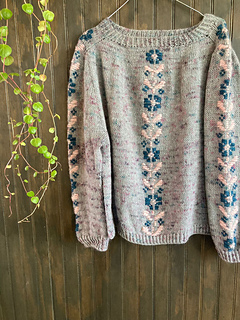patterns >  Paulina Castell's Ravelry Store
Paulina Castell's Ravelry Store
> Sweater Herbolaria







Sweater Herbolaria
Herbolaria es un sweater con aplicaciones botánicas en la técnica de roosimine, que “trepan” por mangas, espalda, delantero y pretina. Está inspirado en la nobleza de las plantas silvestres, capaces de crecer en los ambientes y climas más inhóspitos y de recorrer superficies impensadas en la búsqueda de luz y vida. La misma vida que potencia la herbolaria, que trata el conocimiento y el uso de las plantas con fines curativos.
CONSTRUCCIÓN
Se teje en circular de arriba hacia abajo y se da forma a la pechera con el método de hombro contiguo, lo que permite insertar un motivo en roosimine desde el hombro, a lo largo de ambas mangas, en la parte central de la espalda y del delantero.
Se inicia con el cuello, para seguir con la pechera y luego se realiza la separación de cuerpo y mangas, dejando los puntos de éstas en espera. Se trabaja el cuerpo continuando los motivos de espalda y delantero y realizando una cenefa de roosimine previa a la pretina, la que se teje en elástico simple. Luego se retoman los puntos en espera de las mangas las que se hacen rectas y continúan la cenefa iniciada en el hombro contiguo y se cierran con algunas disminuciones y un puño en elástico simple.
Para la construcción de esta prenda me basé en el método de hombro contiguo de Susie Myers: https://www.ravelry.com/patterns/library/contiguous
TALLAS
El sweater está disponible en 9 tallas y considera una holgura positiva de 12 cm a la altura de la circunferencia de busto: 87 (97, 107, 117, 127) (137, 147, 157, 162) cm.
HILADO
Para la muestra se utilizó: 100% acrílico de Cisne Elegance (100 g / 180 m) en el color 743, crudo (C1)
100% acrílico de Ukryl Dorado (100 g / 220 m) en los colores Verde (C2) y Rosa (C3).
Metraje: Utilizarás aproximadamente 810 (875, 925, 970, 1050) (1100, 1160, 1260, 1290) m de C1 / 110 m de C2 / 110 m de C3.
Gramaje: 450 (485, 520, 540, 580) (610, 645, 700, 720) g. de C1 / 50 g de C2 / 50 g de C3
Se requieren agujas circulares de de 4.0 mm o el grosor necesario para alcanzar la muestra de tensión y agujas circulares de 3.5 mm o 0.5 mm más delgadas que las agujas más gruesas, para puño y pretina.
El patrón incluye tutoriales para guiarte paso a paso en las técnicas que no conozcas.
ENGLISH
Herbolaria is a sweater with botanical applications in the roosimine technique, which “climb” up the sleeves, back, front and waistband. It is inspired by the nobility of wiRS plants, capable of growing in the most inhospitable environments and climates and wich cover unexpected surfaces in search of light and life. The same life that enhances herbal medicine, which deals with the knowledge and use of plants for healing purposes.
CONSTRUCTION
It is knitted in the round, topdown and the yoke is shaped using the contiguous shoulder method, which allows a roosimine motif to be inserted from the shoulder, along both sleeves, to the mid back and front.
It begins with the neck, to continue with the yoke and then the separation of the body and sleeves is made, leaving the stitches of these on hold. The body is worked by continuing the motifs on the back and front and making a roosimine border before the waistband, which is worked in simple elastic. Then the stitches on hold for the sleeves are picked up, which are made straight and continue the border started on the contiguous shoulder and are closed with some decreases and a simple elastic cuff.
For the construction of this garment I used Susie Myers’ contiguous shoulder method: https://www.ravelry.com/patterns/library/contiguous
SIZES
The sweater is available in 9 sizes and considers a positive ease of 12 cm at the height of the bust circumference: 87 (97, 107, 117, 127) (137, 147, 157, 162) cm.
YARN
For the sample I used: 100% acrylic from Cisne Elegance (100 g / 180 m) in color 743, ecru (C1)
100% acrylic from Ukryl Dorado (100 g / 220 m) in the colors Green (C2) and Pink (C3).
Yardage: You will use approximately 810 (875, 925, 970, 1050) (1100, 1160, 1260, 1290) m of C1 / 110 m of C2 / 110 m of C3.
Grammage: 450 (485, 520, 540, 580) (610, 645, 700, 720) g. of C1 / 50 g of C2 / 50 g of C3
4.0 mm circular needles or the thickness necessary to achieve the gauge and 3.5 mm circular needles, or 0.5 mm thinner than the thicker needles, are required for cuffs and waistbands.
The pattern includes tutorials to guide you step by step in the techniques you don’t know.
189 projects
stashed
62 times
- First published: July 2023
- Page created: August 4, 2023
- Last updated: August 5, 2023 …
- visits in the last 24 hours
- visitors right now





